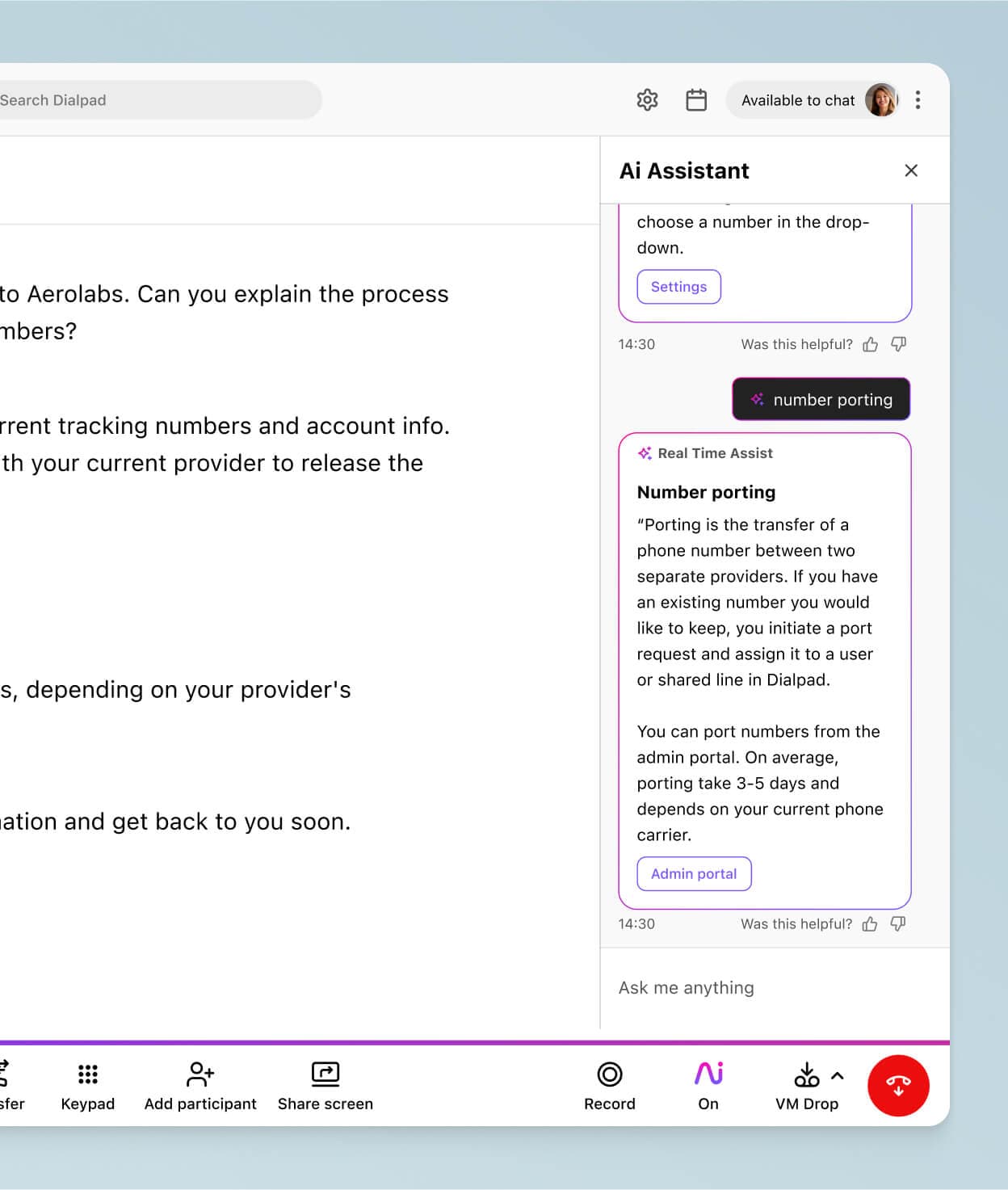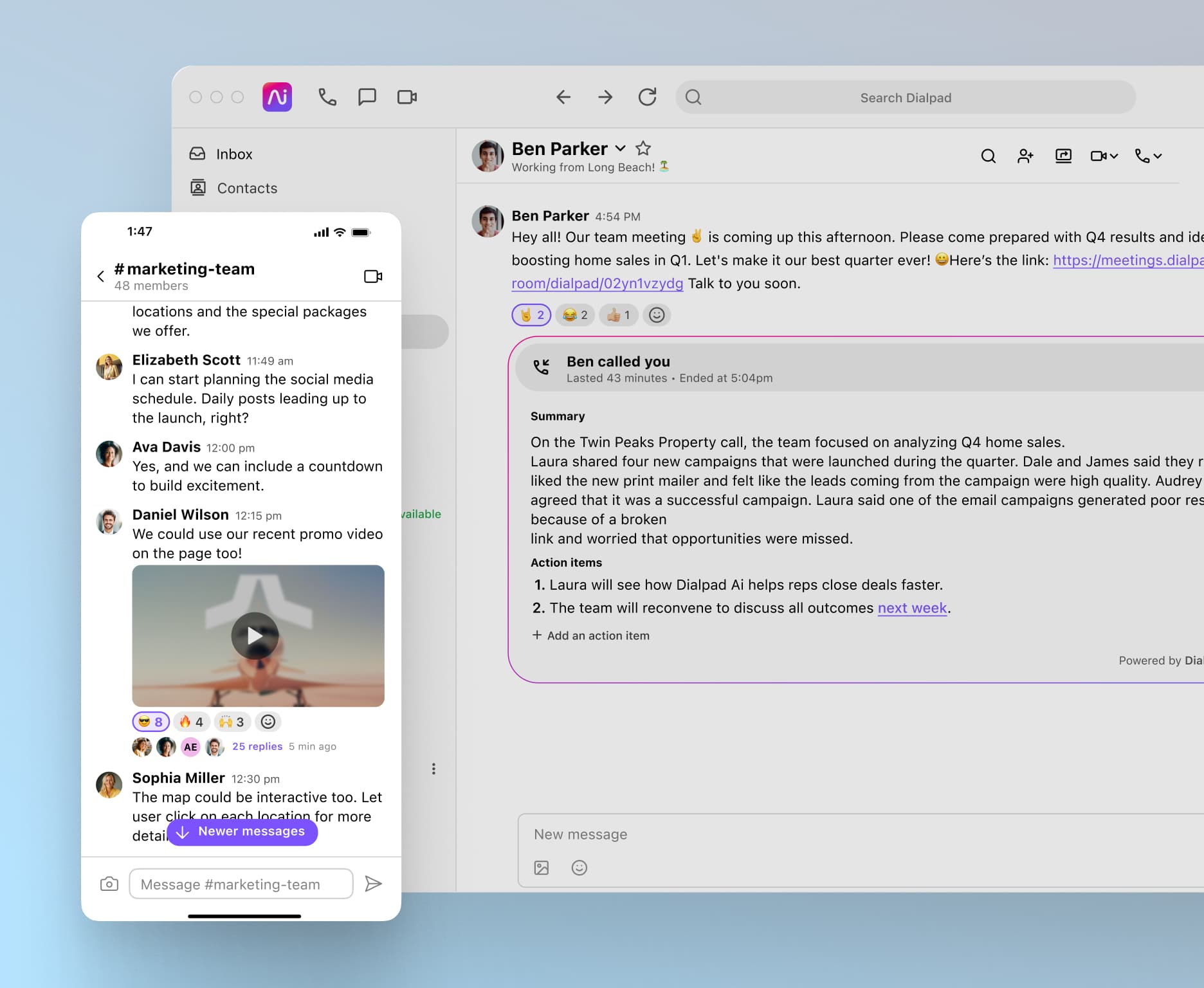a guide
Hosted PBX
Learn about how hosted PBX works in this guide—and if you're looking for an AI-powered collaboration platform for your organisation, book yourself a product tour of Dialpad to see how it can work for you!

What is PBX?
First, a quick refresher on what "PBX" is: A PBX (Private Branch Exchange) is an old-fashioned term that originates from decades ago.
Originally, phone systems were installed in centralised offices, staffed by operators who would manually connect calls together: a Branch Exchange.
If you called another city, you’d dial the operator (we didn’t have numbers back then) and ask the operator for your friend / family / whatever. They would look up the city and then connect your call to the next exchange in that city, who’d then do the final connection to whomever you were calling.
Then they’d stare at the lights and when it went out they’d know the call was completed, note the time for your bill, and move on to the next call.
It’s all utterly fascinating (kind of) but as companies got larger and larger, they needed an in-house version of this to connect all the calls more efficiently. So, a private version of this was created… And voila, the Private Branch Exchange was born.
(If you’ve ever seen Mad Men, the agency had one of these rooms.)
PBX systems go digital
Somewhere in the late ‘60s, the manual operator was replaced by a machine that could connect these calls automatically or via a central operator staffed by the company. Over the next few decades, this became the standard for all companies, large and small. Each phone and extension was hard-wired to the phone system, and this limited what you could do for a company that had multiple offices—or worse, were in multiple countries.
In the 1990s, IP-PBX came into the market and it used computer networks to connect phones to each other and the main “phone system” (instead of direct wiring). These were easier on price and just packed full of features: voicemail, auto attendants, hunt/ring groups, extensions... Really advanced things.
As the use of the Internet increased from the 1990s onward, manufacturers figured out how to connect phone systems over greater distances—soon, you could actually build one phone system to service all your offices, even globally. That’s where PBX hosting comes in...
What is a hosted PBX phone system?
A hosted PBX system is essentially a more evolved type of IP-PBX, but even it has a few shortcomings in terms of technology and scalability (more on that in a bit).
Hosted PBX systems, like IP-PBX, are Internet phone systems that let employees dial in remotely and access additional helpful functionalities. They provide businesses with pretty much the same PBX features as traditional on-premises PBX systems—while eliminating the need for as much in-office hardware.
(Equipment is housed by your hosted PBX provider in a data centre, and software and features like call forwarding and conferencing are taken care of too.)
This means you don’t have to worry about the same maintenance and training requirements as you would with traditional PBX, since your provider manages all the hardware, software, security, and upgrades.
But even though the tech needed to run the phone system is located off-site, hosted PBX doesn’t give you the same freedom and advantages as a cloud phone system that can transfer calls entirely over the Internet. All calls, signalling, and features are still handled through an IP-PBX server. This is just hosted at your provider’s location.
Hosted PBX solutions offer a range of basic call management features that can increase the professionalism of your business. These features includecall forwarding, call queues, call transfer, and caller ID:

But, hosted PBX phone systems come with their own set of limitations. For one, not all of them will be compatible with your computer. And, because they only handle phone calls, they often don't cover other communication channels you might need, like instant or SMS messaging.
They also won’t necessarily have a desktop or mobile app that allows you to make calls from your computer or mobile device, and you’ll often be charged separately for features like call recording and CRM integration. (And if you need contact centre features or detailed reports and analytics, you'd have to get those separately too.)
Rather than a hosted PBX phone system, the most forward thinking businesses are turning to more holistic solutions.
Dialpad’s AI-powered collaboration platform is a prime example. It provides one collaborative workspace for all your customer communications. That helps to produce a more seamless customer journey, as customers who contact you get the same quality of service, regardless of the channel. What’s more, powerful AI-driven features are also built in to help both users and customers:

How does hosted PBX for business work?
There are three basic components required to make hosted PBX services work:
Hosted PBX provider
The hosted PBX provider is the “host” of the PBX system. All equipment is stored in data centres, and the provider takes care of all maintenance requirements. The role of the service provider is to ensure you’re provided with reliable, efficient, and secure phone services.
VoIP phone
A hosted phone system requires endpoints to send and receive voice signals. A VoIP phone system is kind of like a small computer and it works by taking analogue voice signals and using packet-switching technology to convert these into digital signals.
The VoIP service provider facilitates the VoIP connection. Digital signals are then sent as data packets over your broadband line. In practical terms, this is “phone over the Internet.”
When using a hosted PBX solution, the endpoint could be an IP phone or a traditional deskphone with an adapter. It could also, however, be a softphone desktop or mobile app or a mobile phone with the right software.
Internet
The final piece of the hosted IP PBX puzzle is an internet connection! You can leverage the internet connection you already have, meaning no expensive phone line installation! This means you can remove a whole set of costs at each of our offices and leverage the Internet you’re already paying for.
If you need to start small, you can do so without compromising the future growth of your company. This is equally important for businesses that experience frequent demand fluctuations. You can add and remove users or features as and when you need them.
Business benefits of a hosted PBX service or (better still) an holistic collaboration platform
There are plenty of reasons why businesses are moving away from traditional, on-premises phone systems and towards either hosted PBX solutions or more holistic collaboration platforms. Here are just a few of the main benefits:
Hosted PBX features
With hosted PBX (and particularly, cloud-hosted PBX systems, you’re not limited to your existing phone features or those of your on-site, traditional PBX. Instead, you get access to a number of call management features, such as call transfer and voicemail.
A fully VoIP-based phone system, meanwhile, introduces further features like call recording, real-time transcription, IVR, call forwarding, call queue, and auto attendant features to name just a few. These are typically available via a web portal which is updated automatically as existing features are improved and new features are added:

More holistic collaboration platforms like Dialpad contain a hosted phone system with all those features, but also offer users text-based communication options, video conference calls, and easy call transfer options, and plenty more.
From the customer’s perspective this allows a seamless experience and it’s easier for staff to stay connected with each other and their customers via any platform they choose, too.
Cost-efficiency
Hosted PBX pricing and cost-efficiency is also often held up as an advantage of these systems over legacy telephony setups—and rightfully so.
With a hosted PBX system, businesses save money on hardware installation and maintenance. It’s also generally easier and cheaper to scale up or further customise a hosted system when needed.
A customer engagement platform like Dialpad introduces more cost-efficiencies, too. With such a unified system in place, all of your business communication is covered by one subscription. That means no more paying for a whole heap of separate solutions.
Suitability for remote work
Businesses today are increasingly embracing hybrid and remote work. Cloud-hosted PBX systems and—especially—software-based collaboration platforms are much better suited to these working arrangements.
Dialpad’s AI-powered workspace, for example, is available to all your employees via a desktop app, mobile app, and in-browser. That means they get full functionality on any device, wherever they are, and whenever they need it.
Why your business needs more than just a hosted PBX system
A hosted PBX system is great—it takes the pressure off your IT team by using a provider to handle everything from updating software to storage and fixing bugs.
These systems are useful for large, complex organisations and there are plenty of benefits associated with using a virtual PBX system for small businesses and startups, too.
However, modern organisations need more from business communications. A simple hosted PBX system doesn’t cut it. To deliver the kind of joined-up, seamless experiences that customers expect, you need an AI-powered collaboration platform.
Looking for more than a hosted PBX phone system?
Dialpad gives you not only phone calls, but also video conferencing, instant / SMS messaging, and more—all in one easy-to-use platform. Sign up for a free 14-day trial to get set up with a virtual business number and try it out for yourself. Or, take a self-guided interactive tour of the app!








